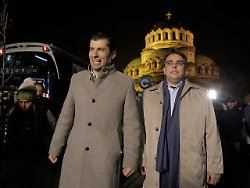Monday 15th November 2021
Newbies win election
Bulgarians vote for government
Bulgaria is the poorest country in the EU. Corona and worries about an economic crisis are burdening the country. After the election, an anti-corruption party now has the best chance of forming the new government. The third vote this year could finally resolve the political stalemate.
Two Bulgarian graduates from the US elite Harvard University could hardly hide their joy on election night. Because their newly founded party “We continue the change” (PP) surprisingly won the third parliamentary election in Bulgaria since spring with around 25 percent. The anti-corruption party of the former interim ministers Kiril Petkow and Assen Wassilew are now given a good chance of forming a coalition government in Sofia after a month-long stalemate.
The bourgeois GERB of Prime Minister Boiko Borissow, who was voted out of office in April, was burdened with corruption allegations and ended up in second place with 22 percent, according to official interim results. A total of seven parties, including a nationalist one, are likely to move into the newly elected parliament.
“The success of the two (Harvard graduates) lies in the fact that they offered a positive agenda,” said the renowned political scientist Parvan Simeonov on the election agenda of Petkov and Vasilev. Her top priority is “zero corruption” in Bulgaria, which, according to Transparency International, is one of the most corrupt EU countries. Petkov announced an overdue judicial reform. Control over public money and more innovation are further reform goals.
“Bulgaria is embarking on a new path,” said PP co-chair Kiril Petkov on election night. The PP wants to start talks with other parties. Petkow, who is considered a candidate for the post of head of government, ruled out a collaboration with Borissows GERB and the Turkish party DPS.
Runoff election for president
Citizens and observers agree that the poorest EU country urgently needs a government capable of acting. It faces mountains of problems such as a violent fourth corona wave, rising energy prices, impending economic crisis and, last but not least, a blockade of the EU admission talks with North Macedonia by Sofia. These problems could only be tackled by an elected government.
President Rumen Radew announced the day after the election that he wanted to convene parliament as soon as possible. “I hope the parties will overcome their differences this time (…) and we will have a stable majority that will form a government,” he said.
Radew is aiming for re-election as his term of office as head of state ends in early January 2022. Although he won the first round of the presidential election on Sunday with a good 49 percent, a runoff election should decide whether he will remain in office for another five years. Radew’s challenger is the rector of Sofia University, Anastas Gerdschikow, who comes in second with around 22 percent. The election victory of the anti-corruption party affiliated with Radev had devastating consequences for the rest of the anti-Borisov camp.
Entertainer Slawi Trifonow’s ITN party, which had won the election in July as a bearer of hope, now came in fifth with 9.7 percent. The socialists also suffered a heavy defeat with a good 10 percent. The co-head of Democratic Bulgaria, Hristo Ivanov, resigned after a disappointing election result of only 5.9 percent. And the loud protest party “Stand up to BG! We’re coming!” remains outside parliament with 2.2 percent.
